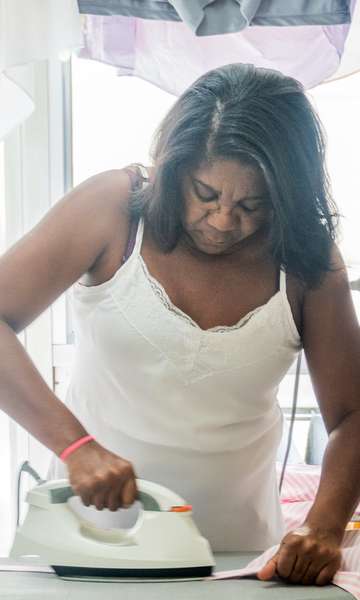In Brazil, child domestic work disguised as charity persists; learn about three stories of women exploited in childhood in Pará
Luana almost died of exhaustion when she was exploited for housework as a teenager. Leila was left in the home of strangers at the age of 15 to serve a family in slavery-like conditions. Josiane says she was “welcomed” by a family when she was 7 years old, but once she got there, she started taking care of the housework: washing, sweeping, folding, taking care of the other children…
They were deceived by the bosses who took them away from their parents and said they would give them a better life, that they would study. All lies, it was just hard work. The place at school and the salary never arrived. Forbidden to sit at the table, turn on the light, relegated to a small room, forced to eat what they didn’t like, distributed as objects. Offended, harassed and embarrassed. “Worth-haired, hard-haired, worthless nigger.”
They worked day and night. They slept crying. Their childhood and adolescence ended as soon as they crossed the doors of the so-called “family homes”, which left traces until old age. Today these three women tell their stories here. They all happened in the state of Pará, they resisted years of exploitation and built their lives with moments of pain, joy and hope.

How to identify domestic work analogous to slavery
Read their stories here:
“I wanted to work, not be a slave”
“I don’t recommend it to anyone”
“I don’t think I ever quite understood what happened to me”
Brazil has come a long way in terms of domestic workers’ rights, but much remains to be done, especially in combating the dangerous link between domestic service and child labour. The presence of “adopted daughters” in middle- and upper-class Brazilian families was more prevalent in the past, but has not been completely overcome. In Pará, where the practice greatly affects the indigenous community, there are thousands of children in this situation.
“ADOPTED” BY A FAMILY
The figure of “adopted daughters” is very popular. The girls, who come from within and from the suburbs, are “adopted” by a family in the center with the offer of greater education and the possibility of social mobility. The promise is that “they would be treated as if they were part of the family”, but the practice is that of the exploitation of child labour, often analogous to slavery. This is explained by researchers Danila Cal and Rosaly Brito, editors of the book “Communication, gender and domestic work”. “The idea of ’being part of the family’ would justify the non-payment of the women and children who work in the house”, underlines Danila. The profile of this exploration has changed over time. The researcher states that, in the past decades, “classic” domestic child labor was carried out by girls coming from inland municipalities to the capitals. Currently the scenario also involves poor women who need to look after their children while working outside the home: as they receive the minimum wage, they cannot afford a professional and turn to the teenagers in the neighborhood, repeating the cycle of exploitation.
THE ILLUSION OF FAMILIARITY
The relationship between employers and adolescent domestic workers becomes more complex because, despite hierarchical differences, they share gender issues which, at certain times, it can create the illusion of equality or even familiarity.
“Exploiters use the term ‘foster child’ as a substitute for ‘slave labour’, ‘menial labour’, ‘labour overexploitation’ and the like,” says Maria Zuíla Dutra, National Director and Regional Coordinator of the Program to Combat the Stimulus learning of working children and labor justice. She remembers that these girls aren’t even treated like children. They are exploited “inhumanely, because in addition to losing their childhood, they almost never go to school and don’t have the opportunity to play with other children”, she says.
There is a race issue in all of this. Colonial thought suggests that blacks were born to do manual labor. This is what the article suggests. “Family friendly”: visual signs of inequality in PEC news coverage of domestic workers”, by researchers Louise Nascimento and Kelly Prudencio. “Black women were born to be maids, nurses, cooks, maids, laundresses, seamstresses, among others, possessing innate talents for this, unlike white women, who, in this view, were born to command, manage and dominate” , quotes the study.
THE WORST FORMS OF WORK
According to information from the project, in 2019, there were 118,768 children and adolescents aged between 5 and 17 employed in child labor in Pará “Children free from child labour”of the Ministry of Labor (MPT). The domestic service is one of the top three activities carried out by this age group (7,972, equal to 6.7% of the total).
OR Statute of childhood and adolescence (ECA) prohibits work for those who have not yet turned 16. An exception is the condition of apprentice, permitted from the age of 14. For night, dangerous, unhealthy work or for TIP list activities (worst forms of child labour), the ban extends up to under 18 years of age.
According to Lucileide Mafra Reis, president of the State Union of Domestic Workers, more than 390,000 domestic workers and 28,000 day laborers are registered in Pará. In the Dieese database (Interunion Department of Statistics and Socioeconomic Studies), the estimate is around 192,000 throughout Pará, of which 80% are informal. The union carries out inspection actions in more than 900 condominiums in the capital Belém, increasing the number of workers – how many are monthly and daily. Lucileide explains that the girls do not report exploitation. “We have to go in front of the condominiums to observe them and bring them closer to the exit.” According to the president of the trade union, in many investigated cases of exploitation, the accused families continue to claim to help children.

See 6 organizations supporting women victims of violence
THE MAID’S ROOM
In cubicles hidden behind the laundries of luxury apartments in the capital of Pará, sometimes without windows, the girls continue to live in miserable conditions, without access to basic rights, such as documents, health and education. “The modern slave quarters is the maid’s room.” The sentence is in the book “Eu, maid domestic”, published by Editora Letramento in 2019, by the writer Rare black.
Constitutional amendment 72, the PEC of the maids, which guaranteed labor rights to thousands of workers in Brazil, turns 10 in 2023. With the entry into force of the amendment, 8-hour working day (44 hours per week), overtime, holidays, 13th salary, leave of maternity, disability, retirement, age and time of contribution. The rules regulate this way of working at a certain level, just a decade ago, and still haven’t solved many problems, above all that of informality.
Click here to access the original report.
Source: Terra
Rose James is a Gossipify movie and series reviewer known for her in-depth analysis and unique perspective on the latest releases. With a background in film studies, she provides engaging and informative reviews, and keeps readers up to date with industry trends and emerging talents.








